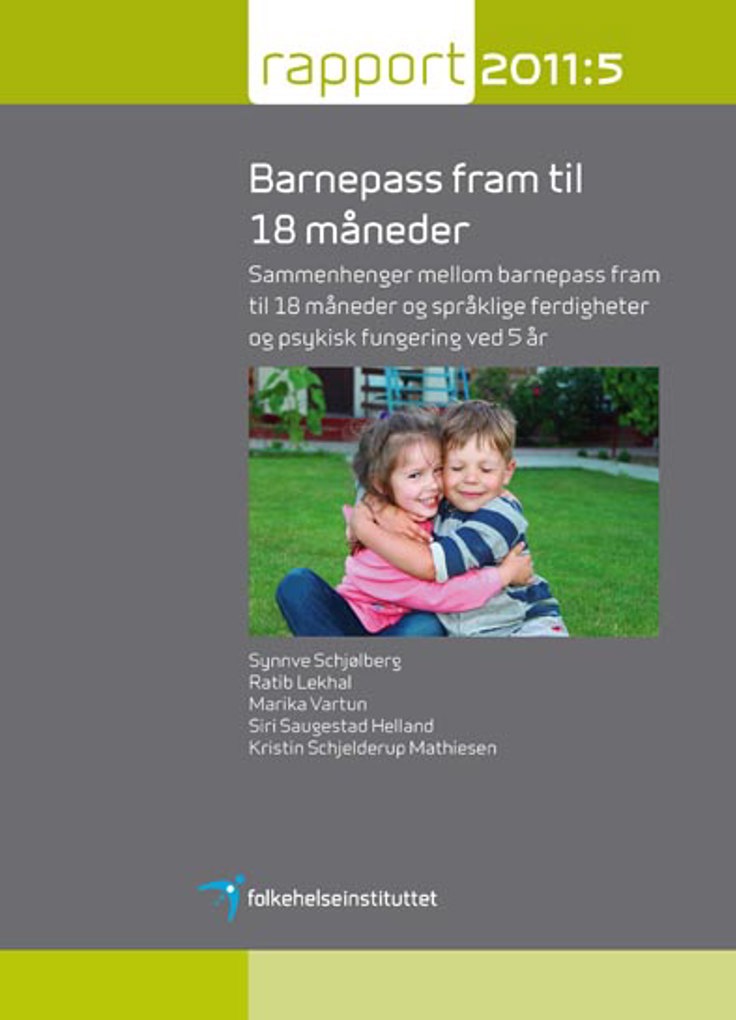Main findings from Report 2011:5 Childcare up to 18 months
Report
|Last update
Key findings
- Among 18 month olds in childcare, the large majority attend kindergarten. The current trend is for children to remain at home through the first 10-12 months, when they begin at kindergarten. Across the data collection period, we found 40% of 18 month olds attended kindergarten, while 26% of 18 month olds were in the care of a nanny or family day care. By contrast, more recent years show a higher number of children at kindergarten at 18 months, and fewer at home or in nanny or family day care. In 2008 and 2009, 59% of all 18 month olds attended kindergarten, while 15% were cared for by a nanny or at a family day care.
- The number of hours children are in childcare outside the home at 18 months old has increased. From 2001 to 2009, 63% of 18 month olds spent between 25 and 40 hours per week cared for by someone other than their parents. On average, the hours 18 month olds spent in childcare increased from 27 hours per week (2001 - 2003) to 31 hours per week (2007 - 2009).
- More than half of 5 year olds attend a public kindergarten. 98% of 5 year olds enrolled in MoBa attend kindergarten, with about half of those (52%) attending public kindergartens, and slightly fewer (45%) attending private kindergartens.
- Selection of childcare type is associated with maternal educational level. The proportion of 18 month olds at home declined from 2003 to 2009. In MoBa, the most significant change was among children whose mothers have not completed high school, whose participation in childcare outside of the home increased from 40% in 2003 to 63% in 2009. On average, a greater proportion of mothers with lower educational levels care for their children at home until they are 18 months compared with mothers with higher education levels (50% vs. 14%). Additionally, lower maternal education was also more frequently associated with children in nanny-care or family daycare, compared with children of more highly educated mothers.
- A child's age at start of childcare varies with parental language background. Children with two Norwegian-speaking parents are slightly more likely to be cared for outside home at 18 months, compared with children in families without a native Norwegian-speaker (74% vs. 65%).
- Childcare before 18 months of age is slightly correlated with language difficulties at 5 years. A slightly higher proportion of boys starting in childcare outside the home before 18 months have language-related problems at age 5, compared with boys who are cared for at home.
- A small correlation between starting childcare before 18 months and behavioral problems at 5 years. A slightly higher proportion of boys starting in childcare outside the home before 18 months have symptoms of behavioral problems at age 5, compared with boys who are cared for at home.
- A small correlation between being in childcare more than 40 hours a week at 18 months and behavioral problems at 5 years. A slightly larger proportion of both girls and boys cared for outside the home for 40 hours or more per week at 18 months show symptoms of behavioral problems at 5 years of age, as compared with children who spent less than 40 hours per week in childcare outside the home.
- There is no relationship between type of child care and emotional problems at 5 years. Regardless of when children start in child care outside the home, neither girls nor boys in childcare were more anxious or sad than those cared for at home.
- Many children have documented developmental problems, or increased risk of developing such, from the first year of life. Almost 5% of 5 year olds have birth defects, syndromes or serious medical problems originating at birth. Additionally, more than 7% of 5 year olds are at risk for developmental difficulties. Parents of 1 of every 3 children enrolled in MoBa have indicated that they are anxious about their child’s development, worried that something might be wrong or that professionals have given the child a diagnosis at some point during the child’s first 5 years. Because the effect sizes of significant correlations in this study are small, significance of the differences between children with different child care histories cannot be considered clinically important. The small differences may attributable to the fact that some children are more vulnerable to timing or duration of the start of childcare outside the home, or perhaps in quality of care received. More detail on these themes will be shared in future publications.
How to cite this report:
Schjølberg S, Lekhal R, Vartun M, Saugestad Helland S and Schjelderup Mathiesen K. Barnepass fram til 18 måneder. Sammenhenger mellom barnepass fram til 18 måneder, språklige ferdigheter og psykisk fungering ved 5 år. Oslo: Nasjonalt folkehelseinstitutt; 2011, rapport: 2011:5.Available at: http://www.fhi.no/dokumenter/7055aa7c1d.pdf (Norwegian)


